The gas turbine service market is estimated to be valued at USD 23.5 billion in 2025 and is projected to reach USD 54.6 billion by 2035, registering a compound annual growth rate (CAGR) of 8.8% over the forecast period. The market value increase from 2025 to 2035 shows strong growth potential. This data suggests a market share gain rather than erosion during the forecast period. The year-on-year increments demonstrate steady growth, with the market projected to reach USD 27.8 billion by 2027 and USD 35.8 billion by 2030.
These consistent increases highlight expanding demand for maintenance, repair, and overhaul services in gas turbine operations. Such growth signals a positive shift in market share, supported by factors such as aging gas turbine fleets, demand for enhanced efficiency, and increasing industrial and power generation activities. From 2031 to 2035, the market is expected to further accelerate, reaching USD 54.6 billion.
This phase likely reflects increased service contracts, technological upgrades, and aftermarket opportunities, contributing to overall market share gains. No indications of market share erosion are evident given the steady, upward trajectory.
Competitive dynamics, evolving technology, and rising emphasis on operational reliability reinforce the growth momentum. The market is projected to gain market share through consistent growth, driven by service demand increases and expanding aftermarket opportunities within the energy sector over the forecast horizon.
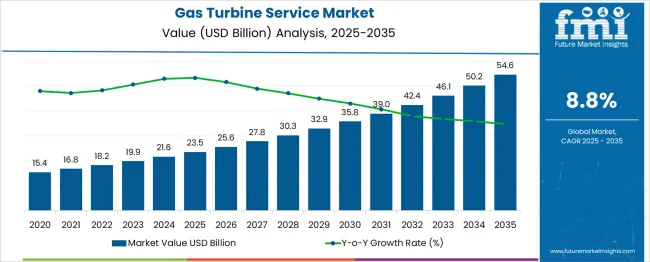
| Metric | Value |
|---|---|
| Gas Turbine Service Market Estimated Value in (2025 E) | USD 23.5 billion |
| Gas Turbine Service Market Forecast Value in (2035 F) | USD 54.6 billion |
| Forecast CAGR (2025 to 2035) | 8.8% |
As global energy policies emphasize cleaner alternatives to coal, natural gas has emerged as a critical transitional fuel, leading to expanded deployment of gas turbines in both developed and emerging economies.
This transition is prompting operators to focus heavily on lifecycle efficiency and long-term operational reliability, thereby increasing the demand for service-based models, including predictive maintenance, upgrades, and real-time diagnostics. The need for improved turbine availability and enhanced thermal efficiency has driven the adoption of advanced service frameworks integrated with digital twin technologies and condition-based monitoring systems.
Additionally, increasing environmental regulations are compelling asset owners to reduce carbon footprints, which is being addressed through performance tuning and emissions optimization services. As gas turbines continue to be a key asset in balancing grids amid the volatility of renewable energy, service markets are expected to gain further relevance in maintaining both economic and sustainable operations.
The gas turbine service market is segmented by product, service, application, service provider, and geographic regions. By product, the gas turbine service market is divided into heavy-duty Aero-derivative. In terms of the gas turbine service market, it is classified into Maintenance, Repair, Overhaul, and Others. Based on the application, the gas turbine service market is segmented into Power plants, Oil & gas, Process plants, Aviation, Marine, and Others. The gas turbine service market is segmented into OEM and non-OEM service providers. Regionally, the gas turbine service industry is classified into North America, Latin America, Western Europe, Eastern Europe, Balkan & Baltic Countries, Russia & Belarus, Central Asia, East Asia, South Asia & Pacific, and the Middle East & Africa.
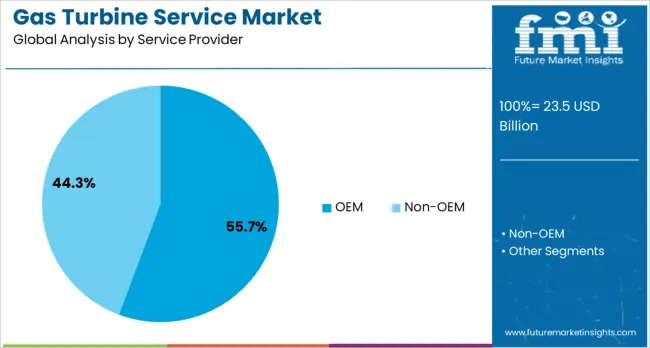
The heavy-duty segment is expected to capture 51.6% of the gas turbine service market revenue in 2025, making it the leading product category. This segment's dominance is driven by the widespread installation of heavy-duty turbines in large-scale power generation facilities and industrial complexes where high output and efficiency are critical.
These turbines typically operate in base-load or intermediate load conditions, exposing them to continuous thermal stress and mechanical wear, thereby requiring consistent service interventions to ensure optimal performance. The long operational lifespan of heavy-duty turbines, often exceeding two decades, necessitates routine upgrades, hot gas path inspections, and component replacements, all of which significantly contribute to the service demand.
The growing shift toward hydrogen co-firing and lower-emission fuels in utility-scale operations is also increasing the need for advanced retrofitting and calibration services within this segment. OEMs and third-party service providers are focusing heavily on heavy-duty turbines due to their higher revenue potential and strategic importance in grid stabilization efforts.
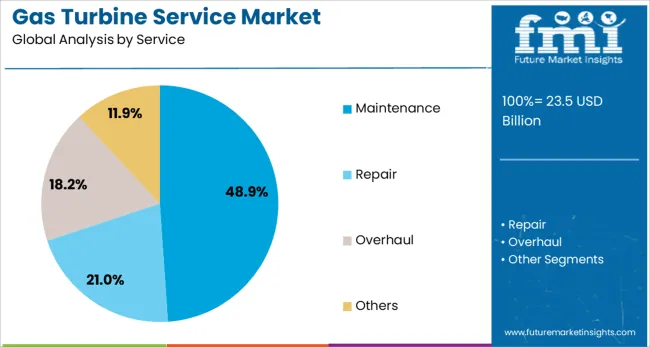
The maintenance segment is expected to account for 48.9% of the gas turbine service market revenue in 2025, driven by the critical role of both scheduled and unscheduled servicing in optimizing turbine performance. Preventive and corrective maintenance are fundamental to ensuring the long-term reliability and safety of turbine operations, particularly in regions experiencing high utilization rates and fluctuating fuel conditions.
As digital technologies enable real-time monitoring, predictive maintenance strategies are being increasingly adopted, allowing operators to identify anomalies before they result in costly downtimes. This shift from reactive to proactive maintenance is fostering higher service engagement across both OEM and independent service providers.
Maintenance contracts that include lifecycle support, remote diagnostics, and performance analytics are gaining traction as asset owners seek predictable operational costs and minimal disruption. The increased reliance on gas turbines to balance intermittent renewable energy supply further underscores the importance of robust maintenance programs in maintaining grid stability and plant efficiency.
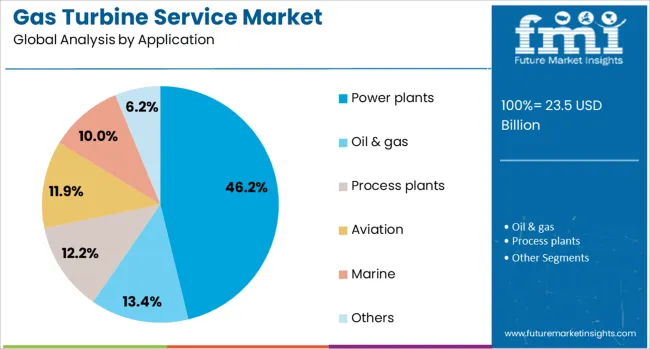
The power plants segment is projected to hold 46.2% of the gas turbine service market share in 2025, reflecting its dominant role in driving service demand across the energy sector. Power generation facilities rely heavily on gas turbines for both base-load and peak-load electricity production, making operational efficiency and availability paramount. Frequent cycling, high thermal loads, and varying fuel qualities necessitate ongoing service engagements, particularly for inspections, combustor tuning, and extending component life.
The growing adoption of combined cycle configurations in power plants is further increasing the complexity and intensity of service requirements. Regulatory mandates on emissions and performance benchmarking are encouraging asset owners to pursue upgrades, retrofits, and efficiency enhancements through targeted service programs.
Moreover, the strategic importance of gas turbines in supporting the integration of renewable energy into the grid has intensified the focus on reliability-centered service models. As utilities and independent power producers aim to optimize the total cost of ownership, the demand for specialized services tailored to power plant operations continues to strengthen.
Gas turbines are widely used in power plants, oil and gas sectors, and aviation, necessitating regular maintenance, repair, and overhaul services to ensure optimal performance and extended equipment life. The market expansion has been driven by the aging turbine fleet, which requires refurbishment and modernization. Service providers have been offering advanced diagnostic tools, predictive maintenance solutions, and remote monitoring services to enhance operational efficiency and reduce downtime.
Predictive and preventive maintenance practices have been increasingly adopted in the gas turbine service market to minimize unplanned outages and optimize asset management. Condition monitoring technologies, which utilize sensors and data analytics, have enabled real-time performance tracking and early fault detection. These services allow for timely interventions, reducing repair costs and extending turbine life. Remote monitoring platforms have facilitated continuous supervision of turbine operations, especially in offshore and remote installations. Service providers have integrated artificial intelligence and machine learning algorithms to enhance diagnostic accuracy and maintenance scheduling. The shift towards predictive maintenance has improved turbine availability and reliability, supporting an uninterrupted power supply. Such advanced service models have become critical differentiators in the competitive gas turbine service market, contributing to enhanced operational efficiency and cost savings.
The aging global fleet of gas turbines has been a major factor driving the demand for comprehensive maintenance, repair, and overhaul (MRO) services. Many turbines installed decades ago require life extension programs, retrofits, and parts replacement to meet current performance and environmental standards. Operators have been investing in refurbishment projects to enhance efficiency and comply with emission regulations. The replacement of worn components, such as blades, combustion systems, and control units, has been essential to maintaining reliability. Service contracts have expanded to include upgrades and digitalization efforts aimed at improving operational monitoring and control. The aging turbine base presents significant business opportunities for service providers, as maintaining and modernizing existing assets remains a cost-effective alternative to new installations.
Digital transformation has played a pivotal role in reshaping the gas turbine service market by enabling remote diagnostics, predictive analytics, and virtual support. The integration of IoT sensors and cloud-based platforms has allowed continuous data collection and analysis from operating turbines. Remote service capabilities have been especially valuable in minimizing downtime and facilitating expert intervention without the need for on-site presence. Virtual reality and augmented reality tools have been employed for technician training, maintenance guidance, and troubleshooting. These digital innovations have improved service response times, accuracy, and customer satisfaction. Additionally, data-driven insights have supported optimized maintenance scheduling and spare parts management. The adoption of digital technologies has enhanced the competitiveness of service providers and is expected to be a key growth driver in the coming years.
The power generation and oil and gas industries have been the primary end-users, driving the growth of the gas turbine service market. The expansion of gas-fired power plants to meet electricity demand, along with the ongoing utilization of gas turbines in upstream and midstream oil and gas operations, has generated continuous service requirements. The need for high availability and efficiency in these sectors has prioritized regular turbine servicing and performance optimization. Offshore platforms and refineries have relied heavily on turbine service contracts to avoid operational disruptions. Furthermore, stringent environmental regulations have necessitated service upgrades to reduce emissions and enhance fuel flexibility. Market players have tailored their offerings to meet the specific needs of these industries, incorporating customized maintenance packages, on-site support, and rapid response teams. The sustained investment in power infrastructure and oil and gas exploration activities is expected to fuel steady growth in the service market.
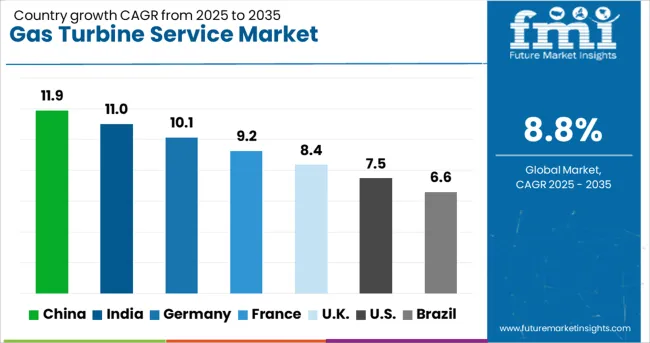
| Country | CAGR |
|---|---|
| China | 11.9% |
| India | 11.0% |
| Germany | 10.1% |
| France | 9.2% |
| UK | 8.4% |
| USA | 7.5% |
| Brazil | 6.6% |
The market is projected to grow at a CAGR of 8.8% between 2025 and 2035, driven by increasing demand for efficient maintenance, repair, and overhaul services amid growing energy production needs. China leads with an 11.9% CAGR, supported by rapid expansion of power generation capacity and investments in turbine upgrades. India follows at 11.0%, fueled by infrastructure development and a focus on reducing downtime. Germany, at 10.1%, benefits from advanced servicing technologies and regulatory frameworks encouraging operational efficiency. The UK, growing at 8.4%, sees increased adoption of predictive maintenance solutions. The USA, with a 7.5% CAGR, experiences steady growth driven by turbine fleet modernization and sustainability goals. This report includes insights on 40+ countries; the top markets are shown here for reference.
China is anticipated to register a CAGR of 11.9% in the gas turbine service industry between 2025 and 2035, driven by the expansion of power generation capacity and industrial applications. Leading companies such as Shanghai Electric and Dongfang Electric are enhancing maintenance and repair services through digital monitoring and predictive analytics. The need for efficiency improvements in combined cycle plants and the integration of cleaner energy sources further boost demand for specialized turbine servicing. Continuous upgrades in turbine components and increased focus on downtime reduction have strengthened market growth.
India’s market is projected to grow at a CAGR of 11.0% during 2025 to 2035, propelled by rising power demand and modernization of aging infrastructure. Key players like Bharat Heavy Electricals Limited and L&T Technology Services provide comprehensive repair and overhaul solutions to thermal and gas-based power plants. Increased government emphasis on reliable power supply and renewable energy integration enhances service requirements. Strategic collaborations with OEMs for advanced diagnostics improve turbine performance and reduce operational costs.
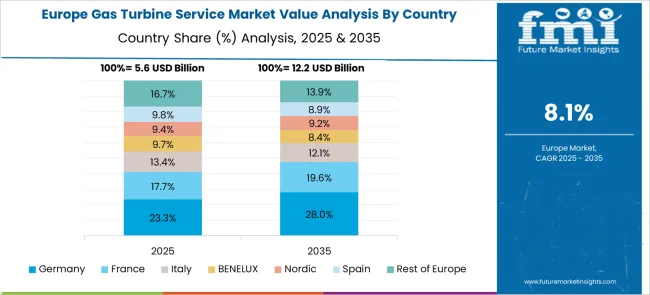
Germany’s gas turbine service demand is expected to advance at a CAGR of 10.1% between 2025 and 2035, driven by focus on energy transition and upgrading conventional power plants. Companies such as Siemens Energy and MAN Energy Solutions lead with innovative service models that include remote monitoring and predictive maintenance. The shift towards flexible and efficient gas turbines supports growth in overhaul and component replacement services. Regulatory pressure on emissions also encourages frequent servicing to optimize performance.
The United Kingdom is forecasted to grow at a CAGR of 8.4% through 2035, supported by power plant upgrades and increasing operational efficiency demands. Firms like Rolls-Royce and GE Power emphasize lifecycle service agreements and digitalization of maintenance processes. Expansion of combined heat and power systems and the need for reduced emissions encourage frequent turbine inspections and refurbishments. Government policies promoting cleaner energy systems contribute to steady service demand.
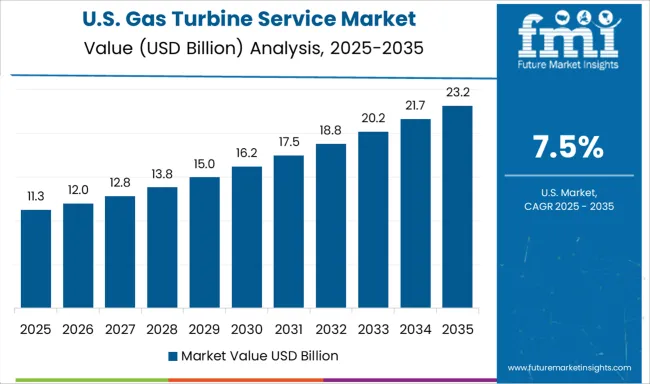
The market in the United States is anticipated to grow at a CAGR of 7.5% from 2025 to 2035, influenced by infrastructure modernization and renewable energy integration. Leading providers such as GE Power and Siemens focus on predictive maintenance and retrofitting services to enhance turbine lifespan and efficiency. Federal incentives for cleaner power generation encourage routine servicing and component upgrades. Investments in automation and digital platforms for turbine monitoring support ongoing market expansion.
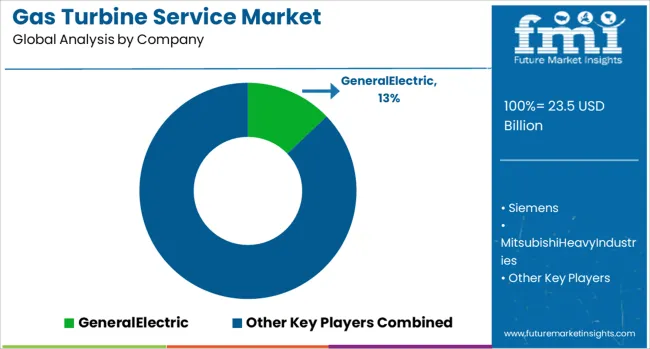
The gas turbine service market is concentrated among a handful of global leaders with distinct operational specializations. Siemens Energy has deployed digital twin-enabled predictive maintenance for SGT-800 and SGT-400 industrial turbines, reducing unplanned downtime and optimizing blade life cycles, while pioneering hydrogen-compatible combustion retrofits for combined-cycle plants in Germany, Italy, and China. GE Power differentiates itself through its Advanced Gas Path program, offering comprehensive inspections of full aeroderivative LM2500 and LM6000 turbines, blade refurbishment with proprietary nickel alloy coatings, and offshore field services for Middle East and North Sea power plants.
Mitsubishi Power focuses on hydrogen-blending readiness in M501J series turbines, providing hot-gas-path inspections and control-system retrofits in Japan, India, and Southeast Asia. Solar Turbines (Caterpillar) emphasizes rapid-response, modular field units that service T-Series turbines for oil compression in North America and Qatar, delivering sub-48-hour turnarounds for critical sites. Ansaldo Energia concentrates on industrial frame turbines in Southern Europe and Africa, leveraging vibration analysis and proprietary rotor life extension techniques. Emerging regional specialists, such as Doosan Škoda Power and Power Systems MHI, target municipal and industrial operators with cost-efficient retrofits and multi-fuel conversions, addressing aging fleets in emerging markets. Market differentiation is driven by hybrid fuel readiness, precision hot-section refurbishment, predictive analytics, and region-specific OEM-partnered service contracts, enabling performance optimization across diverse turbine platforms.
| Item | Value |
|---|---|
| Quantitative Units | USD 23.5 Billion |
| Product | Heavy duty and Aero-derivative |
| Service | Maintenance, Repair, Overhaul, and Others |
| Application | Power plants, Oil & gas, Process plants, Aviation, Marine, and Others |
| Service Provider | OEM and Non-OEM |
| Regions Covered | North America, Europe, Asia-Pacific, Latin America, Middle East & Africa |
| Country Covered | United States, Canada, Germany, France, United Kingdom, China, Japan, India, Brazil, South Africa |
| Key Companies Profiled | GeneralElectric, Siemens, MitsubishiHeavyIndustries, BakerHughes, SolarTurbines, MANEnergySolutions, AnsaldoEnergia, MTUAeroEngines, EthosEnergy, KawasakiHeavyIndustries, CentraxGasTurbines, MJBInternational, Sulzer, PROENERGY, OpraTurbines, UEC-Saturn, VERICOR, and Zorya-Mashproekt |
| Additional Attributes | Dollar sales by service type and turbine application, demand dynamics across power generation, oil and gas, and industrial sectors, regional trends in service contracts across North America, Europe, and Asia-Pacific, innovation in predictive maintenance, remote diagnostics, and digital twin technologies, environmental impact of service-related emissions, parts recycling, and energy consumption reduction, and emerging use cases in life extension programs, hybrid power plant optimization, and integration with renewable energy systems. |
The global gas turbine service market is estimated to be valued at USD 23.5 billion in 2025.
The market size for the gas turbine service market is projected to reach USD 54.6 billion by 2035.
The gas turbine service market is expected to grow at a 8.8% CAGR between 2025 and 2035.
The key product types in gas turbine service market are heavy duty and aero-derivative.
In terms of service, maintenance segment to command 48.9% share in the gas turbine service market in 2025.






Our Research Products

The "Full Research Suite" delivers actionable market intel, deep dives on markets or technologies, so clients act faster, cut risk, and unlock growth.

The Leaderboard benchmarks and ranks top vendors, classifying them as Established Leaders, Leading Challengers, or Disruptors & Challengers.

Locates where complements amplify value and substitutes erode it, forecasting net impact by horizon

We deliver granular, decision-grade intel: market sizing, 5-year forecasts, pricing, adoption, usage, revenue, and operational KPIs—plus competitor tracking, regulation, and value chains—across 60 countries broadly.

Spot the shifts before they hit your P&L. We track inflection points, adoption curves, pricing moves, and ecosystem plays to show where demand is heading, why it is changing, and what to do next across high-growth markets and disruptive tech

Real-time reads of user behavior. We track shifting priorities, perceptions of today’s and next-gen services, and provider experience, then pace how fast tech moves from trial to adoption, blending buyer, consumer, and channel inputs with social signals (#WhySwitch, #UX).

Partner with our analyst team to build a custom report designed around your business priorities. From analysing market trends to assessing competitors or crafting bespoke datasets, we tailor insights to your needs.
Supplier Intelligence
Discovery & Profiling
Capacity & Footprint
Performance & Risk
Compliance & Governance
Commercial Readiness
Who Supplies Whom
Scorecards & Shortlists
Playbooks & Docs
Category Intelligence
Definition & Scope
Demand & Use Cases
Cost Drivers
Market Structure
Supply Chain Map
Trade & Policy
Operating Norms
Deliverables
Buyer Intelligence
Account Basics
Spend & Scope
Procurement Model
Vendor Requirements
Terms & Policies
Entry Strategy
Pain Points & Triggers
Outputs
Pricing Analysis
Benchmarks
Trends
Should-Cost
Indexation
Landed Cost
Commercial Terms
Deliverables
Brand Analysis
Positioning & Value Prop
Share & Presence
Customer Evidence
Go-to-Market
Digital & Reputation
Compliance & Trust
KPIs & Gaps
Outputs
Full Research Suite comprises of:
Market outlook & trends analysis
Interviews & case studies
Strategic recommendations
Vendor profiles & capabilities analysis
5-year forecasts
8 regions and 60+ country-level data splits
Market segment data splits
12 months of continuous data updates
DELIVERED AS:
PDF EXCEL ONLINE
Aeroderivative Gas Turbine Service Market Size and Share Forecast Outlook 2025 to 2035
Gas Turbine Oil Market Size and Share Forecast Outlook 2025 to 2035
Gas Turbine Market - Size, Share, and Forecast 2025 to 2035
Micro Gas Turbine Market Size and Share Forecast Outlook 2025 to 2035
Steam Turbine Service Market Size and Share Forecast Outlook 2025 to 2035
Aviation Gas Turbines Market
Multifuel Gas Turbine Market Growth – Trends & Forecast 2025 to 2035
Oil and Gas Field Services Market Size and Share Forecast Outlook 2025 to 2035
Heavy Duty Gas Turbine Market Size and Share Forecast Outlook 2025 to 2035
Industrial Gas Turbine Market
Oil And Gas Security And Services Market
Combined Cycle Gas Turbine Market Size and Share Forecast Outlook 2025 to 2035
Process Plants Gas Turbine Market Analysis - Size, Share, and Forecast Outlook 2025 to 2035
Power Generation Gas Turbine Market Size and Share Forecast Outlook 2025 to 2035
Power Plants Heavy Duty Gas Turbine Market Size and Share Forecast Outlook 2025 to 2035
Open Cycle Aeroderivative Gas Turbine Market Size and Share Forecast Outlook 2025 to 2035
Upstream Oil & Gas Services Market Growth – Trends & Forecast 2022-2032
Gas Insulated Switchgear (GIS) Bushing Market Size and Share Forecast Outlook 2025 to 2035
Gas Discharge Tube (GDT) Arresters Market Size and Share Forecast Outlook 2025 to 2035
Gas & Dual-Fuel Injection Systems Market Size and Share Forecast Outlook 2025 to 2035

Thank you!
You will receive an email from our Business Development Manager. Please be sure to check your SPAM/JUNK folder too.
Chat With
MaRIA